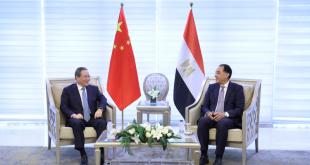Published:July 09,2022
By Guo Heping

Delivering a policy speech, titled “A Global Revolution of Dignity” recently, Samantha Power, administrator of US Agency for International Development, or USAID, tried to sell US-style democracy by claiming US aid helps promote democracy, oppose autocracy and safeguard people’s dignity, while smearing China’s aid policy and criticizing its human rights record. Which shows the United States has been peddling lies in the name of safeguarding “human dignity”.
Lie One: US aid brings democracy dividend.
Truth: Using empty talk to meet the material needs.
Power has been iterating that the US should lead the “global dignity revolution”, whatever that means, support countries undergoing democratization and make aid a “democracy dividend”. But unfortunately she didn’t mention any concrete measures to that end in her latest speech. Using empty talk to meet the material needs of other countries is typical of a braggart.
Even in terms of committed foreign aid, more than one-third of the funds “return” to various US aid agencies under various names. The US is a past master at paying lip service to democracy and human dignity. But if the US believes it has succeeded in fooling all countries with its tricks, it is wrong because even the most righteous concepts and proposals are meaningless without real funds.
Lie Two: China aid for votes at UN.
Truth: Win-win cooperation deepens friendship.
Power also hinted that China has given COVID-19 vaccine aid so it could bend poor countries over a barrel or curry favor for votes at the United Nations. But the fact is, China has not, and will never, interfere in other countries’ internal affairs, impose its will on other countries or attach any strings to foreign aid.
Whether the people of the recipient countries support its aid, whether its aid helps promote socioeconomic development in the recipient countries, and whether the international community is satisfied with its aid are the gold standards for evaluating China’s aid program. Promoting amity, sincerity, mutual benefit and inclusiveness are what decide China’s aid work.
In stark contrast, the US’ vaccine aid carries poison pill clauses, prohibiting recipient countries from accepting vaccines from other countries and giving the US the right to interpret medical malpractice. Also, the so-called preferential loan program of the US Millennium Challenge Corporation can be withdrawn unilaterally if the US, on some pretext, decides it is harming its interests.
An increasing number of countries, including some major Western donor countries, have realized China’s aid program is genuine while US aid is aimed at maintaining its hegemony. China’s aid has been welcomed by the governments and peoples of the recipient countries. And China has been elected as a member of the UN Human Rights Council five times, becoming one of most frequently elected nations to the UN body.
Lie Three: Digital democracy vs. digital authoritarianism.
Truth: US Maintains digital hegemony.
Launching the Digital Democracy Initiative, Power said the US will fight digital authoritarianism and claimed that Serbia is quietly procuring smart city technology from China to harass, intimidate and spy on ordinary citizens.
However, in terms of digital authoritarianism, the US is without an equal. From Prism to Bvp47, Washington has abused its role as a global leader in information and communications technology to launch cyberattacks on other countries and spy even on global leaders. In the past year alone, the FBI conducted 3.4 million searches on US citizens’ electronic data without issuing warrants, according to the Office of the Director of National Intelligence.
Besides, the Danish media reported that the US National Security Agency intercepted the text messages and phone calls of politicians of Germany, France and other European countries. Indeed, the US is the empire of hackers, eavesdroppers and cyber-thieves. On the one hand, the US relies on its high-tech hegemony to eavesdrop and spy on foreign governments and leaders as well as its own citizens. On the other, it uses the excuse of national security to target high-tech enterprises of other countries. If this is not “digital authoritarianism”, what is?
Since digital technology can help developing countries achieve industrial upgrading, the US should not be allowed to use it as a tool to maintain its hegemony.
Yet despite the US sanctions, China has developed digital technology, and used its achievements to promote the Digital Silk Road and help build digital infrastructure in other countries. Chinese companies have participated in a number of undersea cable projects connecting with Africa, Europe, Asia and the Americas, built more than half of Africa’s wireless and high-speed broadband networks, and laid more than 200,000 kilometers of optical fibers, thus helping 6 million households to access broadband connection and serving more than 900 million people in Africa.
Lie Four: Anti-corruption to advancing global democracy.
Truth: Blatant interference in other countries’ internal affairs.
Power also said the USAID had created a new “dekleptification” guide — a handbook to help countries make the difficult transition from “kleptocracy to democracy”. This not only goes against the basic norms of international relations but also is blatant interference in other countries’ internal affairs and an endorsement of “color revolution”.
In his book, Covert Regime Change: America’s Secret Cold War, Lindsey A. O’Rourke, an assistant professor of political science at Boston College, said that between 1947 and 1989 alone, the US carried out 64 operations to overturn governments in other countries.
Irrespective of its claims of safeguarding national security and helping liberate the local people, the US cannot hide its ulterior motive of putting “American first”.
China has never asked other countries to imitate the “China model” of development. Instead, it encourages countries to explore their own development paths, while sharing its experience in governance, reform and development with them.
From 2013 to 2020, China sponsored more than 4,300 people from other developing countries to study for their master’s and doctoral degrees in the country. From 2013 to 2018, China held more than 7,000 projects in human resources development cooperation, benefiting about 200,000 people, covering more than 100 subjects in 17 fields such as rural poverty reduction, medical and health care, education and scientific research. And apart from strengthening the supervision and evaluation of foreign aid projects, China shows zero tolerance for corruption, and has determination to improve the overall efficiency of its foreign aid.
The author is a commentator on international relations.
chinadaily.com.cn
 Africa -China Review Africa -China Cooperation and Transformation
Africa -China Review Africa -China Cooperation and Transformation
